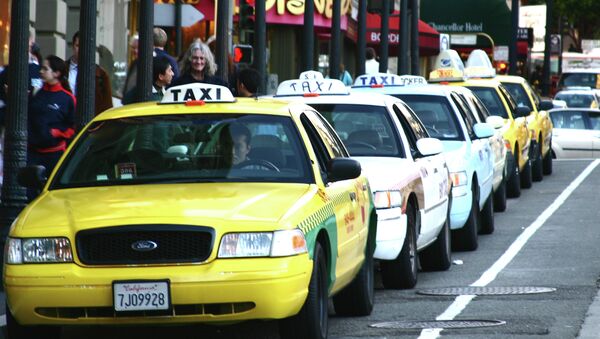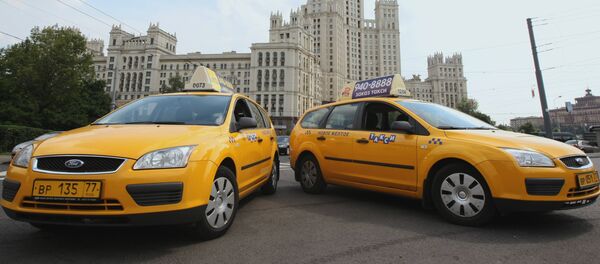MOSCOW, December 9 (Sputnik) – Taxi apps, like Uber and Lyft, who allow smartphone users to hail their own cabs, are becoming increasingly popular these days as their pricing and timing is far better than normal taxis. However, the lack of heavy anti consumer regulation in different parts of world has sparked public concerns of unfair competition, passenger safety and overall quality of provided service.
The recent case of a rape in a taxicab in India’s capital has provoked a global controversy over the alleged need for tougher governmental regulation of taxi apps – the smartphone applications which find a free cqb in a matter of seconds, as they offer appealing fares and well-calculated delivery timing. The Indian rape is blamed by some observers on the cab-hailing app called Uber, the US-based company. This taxi app allows its users to call out for the nearest driver, who has an Uber account.
“All other transport/taxi service providers through web based technology, who are not recognized, are prohibited from providing such services in the NCT of Delhi to public till they get license/permission from the Transport Department,” the statement said, Indian authorities said as quoted by the Wall Street Journal.
Two other taxi apps, working in Indian capital, are Ola Cabs and the Bangalore-based TaxiForSure.
Controversy surrounding the proposed tougher regulation in taxi apps is rife in Singapore, and this time is not directly related to concerns over personal safety of passengers. There is a ‘taxi app war’ raging in the prominent financial centre of Asia-Pacific. At least six taxi apps are competing for the lucrative Singapore’s market, among which are the international giants like Uber, Easy Taxi and the London-based Hailo. In order to establish a successful taxi app operation, massive investment is a must, both in the infrastructure development, and into marketing efforts.
In the battle for the market, yielding 960,000 taxi fares a day, Uber, backed by such American titans as Google and Amazon, has invested some $1.2 bln, offering major discounts to customers and subsidies to drivers, completing fares received via the app. The British Hailo has invested some $77 mln to be spent on free credit rides for first time customers and money lotteries for the drivers. Other companies are also generously spending their money in order to secure their share of the market.
This situation affects the call-centers in traditional cab service arrangements. They are experiencing a decline in consumer demand as apps offer a much cheaper service. The local regulatory body, the Land Transport Authority (LTA), is only fueling the ‘taxi app war’, having introduces the new demand from the New Year for 85% of the taxi companies’ fleet to be on the street as compared to the previous figures of 80%. This means the market for taxi apps is getting bigger, making it an even more attractive target for taxi apps, ultimately benefitting the consumer.
The wave of controversy around taxi apps as possibly violating the law rolled across the United States back in 2012, however, only today it has explicitly reached the global scale. In America, the issue was ultimately resolved by the mandatory licensing of the drivers using e-haling apps. In India, the US-based Uber was expected to abide to the same rules. However, it was not the case. The New Delhi transport department stated that no guidelines existed for online e-hailing companies, who have been providing taxi services by simply connecting the customer with a driver, albeit possibly unlicensed, according to the Times of India. The lacking regulations are likely to be implemented soon, more likely, in a similar manner to those is the US or Singapore.
In Canada, several municipalities, including Toronto, have applied to court last month to ban taxi apps like Uber, in particular, in order to protect the traditional taxi businesses from the new competition. However, Canada’s anti-monopoly body, Canada’s Competition Bureau (CCB), said in a statement that e-hailing apps are ‘good for the public’.
In mainland China, a local taxi app called Didi Dache has raised over $700 mln as of today. The main investors are Singapore-based investment company Temasek Holdings and Russia’s investment enterprise of Yuri Milner, among others, the Wall Street Journal reports. The e-hailing rush has affected China as well, the figures suggest, as the previous round of fund-raising brought Didi only $100 mln this January.
All in all, the international experience has shown that e-hailing is becoming a major force in urban transportation. Insufficient regulation in some places like India is the local authorities’ downfall, as there is successful regulatory practices in several nations. Being an innovative business model, e-hailing benefits the customer, meaning the authorities should adjust their regulations in time instead of trying to stand in the way of progress.






